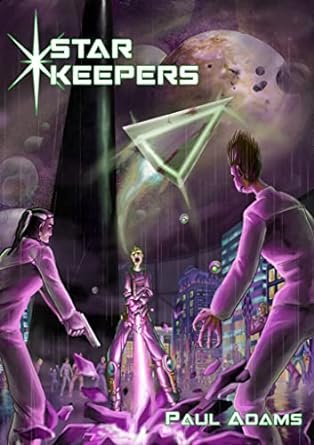SPSFC3 Author Interview- Paul Adams
What inspired the world, characters, or core concepts of your story? Was it a particular event, piece of media, or a speculative scientific idea?
Star Keepers is a story that has grown with me since I was young, ever growing and changing, adapting in new elements until it became the book it is today. Every character and aspect has roots in something I loved as a child, but each has grown beyond that initial spark into something unique and unrecognizable.
How did you approach the creation of your main characters? Were they modeled after real-life figures, or did they evolve organically as you explored the world of your story?
To me, each main character has existed in some form in my mind for much of my life. They have been refined over the years, and it helped to get inside their heads during the actual writing process. I also made sure to specify for myself, at least one thing they love, one thing they hate, one thing they are good at, and one thing they are bad at.
Science fiction often delves into questions of ethics, technology, and humanity. What central theme or moral question does your story grapple with, and why did you feel it was essential to explore?
The biggest exploration of ethics comes with our villain, Digus. Digus is, inherently, not evil, but a desperate person at the end of his rope who takes the only escape route he can see, regardless of the damage he will cause if he takes it. Our heroes come to recognize this about him, and leads them to try and help him out of his situation while preventing him from causing more damage.
How did you approach the integration of futuristic technology or scientific concepts in your story? Did you base them on existing theories or let your imagination run wild?
In the sci fi genre, there are often two categories, hard and soft sci fi. Hard sci fi bases its technology in real world science, presenting these concepts in a more digestible way than just a textbook, but it often lacks in character and story as a result. I appreciate the role hard sci fi plays, but I also resent that it makes up most of the sci fi genre in literature, with most soft sci fi represented through movies and TV. I wanted to create a soft sci-fi series in literature, where the viability of the tech and science doesn’t matter so much, and merely acts as a vehicle for a fun adventure.
The sci-fi genre provides a canvas to depict diverse cultures, species, and worlds. How have you incorporated representation and diversity in your work, and why do you think it's vital for the future of science fiction?
My book has kept its human cast to a minimum, allowing most of the cast to be taken up by strange and unique creatures from across the galaxy, each with their own unique culture and history, that I can then explore in depth, allowing readers to love and empathize with characters of all shapes and sizes, no matter how different they may seem.
Every author has a unique writing process. Can you share a bit about yours? How do you manage world-building, plot progression, and character dynamics in such a complex genre?
I find it helped to sit down and plot out twelve major points to the story. I then split each of those into twelve major smaller points, and on and on until I got down to the nitty gritty details. Once I reached that point, I was free to condense it all down and translate it into prose. This also helped to act as a natural editing process, with me rethinking major plot points and finding solutions to them and reworking them on the third, fourth, and fifth times around.
What's next for you after SPSFC? Are there any upcoming projects you can share with us?
I am currently working on a sequel entitled Star Keepers: Knights of the Sky, with a full series of twelve books planned. Each will take the reader to a unique planet or explore some aspect of the universe, starring both the Arrowhead crew and a number of other friends they pick up along the way. I hope you’ll all come along for the ride.


